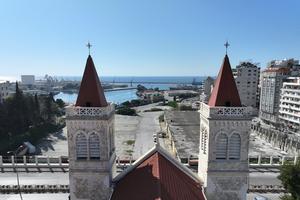Persecuted: Why the Moral Ideal of the Christian Life Serves as a Constant Reproach to an Immoral World
BOOK PICK: ‘The Coming Christian Persecution’

THE COMING CHRISTIAN PERSECUTION
WHY THINGS ARE GETTING WORSE AND HOW TO PREPARE FOR WHAT IS TO COME
By Thomas D. Williams
Crisis Publications, 2023
261 pages; $18.97, hardcover (Kindle, $9.99)
To order: EWTNRC.com
“In 2020, some 4,761 Christians were killed around the world (an average of 13 every day), 4,277 were arrested without trial and imprisoned (11 each day), and 1,710 were abducted (4 per day). In 2019, Open Doors [an international organization working against religious persecution] revealed that, on average, some 345 Christians are murdered around the globe each month because of their beliefs.
On a monthly basis, at least 105 churches or places of worship are vandalized or set on fire, and 219 Christians are put on trial or sent to prison for expressing their faith in the Christian Gospels.”
So why do we hear so little about it?
Williams’ book is a tour de force on Christian persecution today. Surveying the current global situation, he lists eight countries where Christian persecution is especially acute: North Korea, China, Afghanistan, Iraq, Syria, Nigeria, Pakistan and India. He probes the causes, pushes back on the deflections used to mask those causes, and identifies how three overarching forces —communism, Islam and Hindu nationalism — fuel persecution in those eight lands.
The author provides historical and theological context. Christian persecution (and the effort to minimize or pooh-pooh it) is nothing new. The Gospels to show us Christ consistently forewarned his disciples that, like him, they would be signs of contradiction. Williams examines the history of the first three centuries of the Christian era, asking why it was Christians and only Christians whose faith either received begrudging “toleration” or outright roiled the Roman Empire.
Dismissing the excuses Voltaire and Gibbons made for Rome (excuses adapted through the ages for other persecutors), Williams relies on the second-century Patristic “Letter to Diognetus” to argue that it is Christianity’s moral life and the fact it made converts that sits in the craw of opponents.
“The moral goodness of the Christian life — or at least its moral ideal — serves as a constant reproach to an immoral world that wants to be affirmed rather than challenged.”
That leads to Williams’ analysis of Christian persecution in the “liberal democracies” of the West, no doubt another area where Christian persecution deniers get particularly exercised. Persecution in the “Christian” and post-Christian West may not be murderous or even overt, but it exists.
It is in the effort to make public squares naked; to drive practicing Christians (especially Catholics) out of leading professions where their moral commitments clash with secular ideologies; to shut up religion inside sacristies while paring down free exercise of religion to freedom of belief. (You can believe anything you want in your head, but don’t you dare act on it). He identifies additional causes for the silence about this “white” (i.e. non-bloody, as opposed to “red”) persecution: slanted media reporting because of opposition to authentic Christian morality and the explosion of religious indifference (“Nones”) among young people.
Williams is no Pollyanna: He expects things to get worse, not better. That’s why his closing chapter — on “how to prepare for what is to come” — is long on those timeless virtues (like fortitude, patience, even joy) requisite to bearing Christian witness. He even properly notes we should not lose sight that the events of human history can also be parts of the struggle between good and evil that is salvation history.
At the same time, Williams does not limit himself to promoting the armor of virtue: He also pushes for practical efforts to put the global fate of Christians today on the world’s radar and agenda.
An extremely timely book, it’s especially needed, given the mainstream media blackout of this issue and the need to make clear that the world’s largest religion is also the largest victim of religious persecution.















